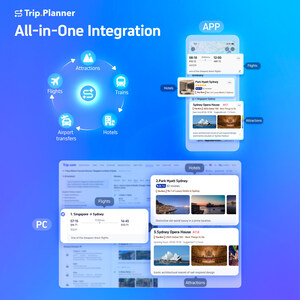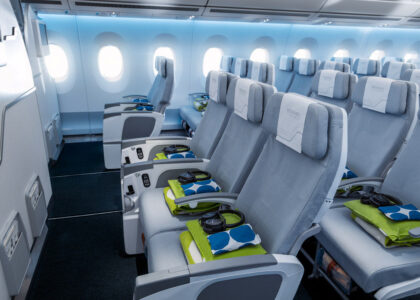The Role of IATA in Shaping the Future of Travel
When it comes to the global travel industry, the International Air Transport Association (IATA) plays a crucial role in ensuring the smooth operation and development of air travel worldwide. With its headquarters in Montreal, Canada, IATA represents around 290 airlines comprising 82% of global air traffic.
Advocacy and Standards
One of the key functions of IATA is advocacy on behalf of its member airlines. By working closely with governments, regulatory bodies, and other stakeholders, IATA helps shape policies and regulations that impact the aviation industry. This advocacy extends to issues such as safety, security, sustainability, and efficiency.
IATA also sets standards and best practices for the industry to ensure uniformity and consistency in areas such as ticketing, baggage handling, and safety protocols. These standards help streamline processes for both airlines and passengers, leading to a more seamless travel experience.
Technology and Innovation
In an increasingly digital world, IATA plays a vital role in driving technological innovation within the aviation industry. From electronic ticketing to biometric identification systems, IATA works to implement cutting-edge technologies that enhance security, efficiency, and convenience for travelers.
Additionally, IATA is at the forefront of initiatives such as the New Distribution Capability (NDC), which aims to modernize airline retailing by enabling personalized offers and content distribution through various channels. This shift towards a more customer-centric approach benefits both airlines and passengers by providing greater choice and flexibility in booking travel services.
Sustainability and Environmental Responsibility
As concerns about climate change grow, IATA is actively involved in promoting sustainability within the aviation industry. Through initiatives like the Carbon Offsetting and Reduction Scheme for International Aviation (CORSIA), IATA is working towards achieving carbon-neutral growth for international flights.
IATA also collaborates with airlines to develop fuel-efficient technologies and operational practices that reduce greenhouse gas emissions. By advocating for sustainable aviation fuels and investing in research on alternative propulsion systems, IATA is committed to minimizing the environmental impact of air travel while supporting the industry’s long-term growth.
The Future of Travel with IATA
As we look ahead to the future of travel, IATA will continue to play a pivotal role in shaping an industry that is safe, efficient, sustainable, and customer-focused. Through its advocacy efforts, technological innovations, and commitment to environmental responsibility, IATA remains at the forefront of driving positive change within the global aviation sector.
Whether you’re a frequent flyer or an occasional traveler, you can rest assured that IATA’s ongoing work will contribute to making your journey smoother, more enjoyable, and environmentally responsible. With IATA leading the way, the future of travel looks brighter than ever before.
9 Advantages of IATA’s Role in Enhancing Global Air Travel
- IATA sets industry standards for a more uniform and efficient travel experience.
- IATA advocates for policies that enhance safety and security in air travel.
- IATA drives technological innovation to improve the overall travel process.
- IATA promotes sustainability initiatives to reduce the environmental impact of aviation.
- IATA offers training programs to enhance the skills and knowledge of aviation professionals.
- IATA provides resources and support for airlines to navigate regulatory challenges effectively.
- IATA’s initiatives like NDC enable personalized offers and content distribution for travelers.
- IATA’s collaboration with governments and stakeholders ensures a coordinated approach to industry challenges.
- IATA’s focus on customer-centric solutions enhances the overall passenger experience.
Challenges and Concerns with IATA’s Influence on Air Travel
- Limited flexibility in airline ticket pricing due to industry standards set by IATA.
- Complexity of navigating through various regulations and standards imposed by IATA for airlines and passengers.
- Potential for increased travel costs as airlines may pass on compliance expenses associated with IATA regulations to passengers.
- Dependence on technology systems managed by IATA, which can lead to disruptions in case of technical issues or outages.
- Environmental concerns regarding the carbon footprint of air travel despite efforts like CORSIA by IATA.
- Possible challenges in resolving disputes or issues with airlines that are members of IATA due to the association’s influence.
IATA sets industry standards for a more uniform and efficient travel experience.
By setting industry standards, IATA plays a crucial role in ensuring a more uniform and efficient travel experience for passengers and airlines alike. These standards cover various aspects of air travel, from ticketing and baggage handling to safety protocols and operational procedures. By adhering to these established guidelines, airlines can streamline their processes, reduce errors, and enhance overall efficiency. For travelers, this means a more consistent and seamless journey, where expectations are met with reliability and precision. IATA’s commitment to setting and upholding industry standards helps create a standardized framework that benefits the entire aviation ecosystem, ultimately leading to a better travel experience for all involved.
IATA advocates for policies that enhance safety and security in air travel.
IATA’s advocacy for policies that enhance safety and security in air travel is a critical pro that underscores the organization’s commitment to ensuring the well-being of passengers and the industry as a whole. By working closely with governments and regulatory bodies, IATA helps shape robust standards and protocols that prioritize the safety of travelers, crew members, and aircraft. Through its initiatives and collaborations, IATA plays a vital role in promoting a secure aviation environment, instilling confidence in passengers and stakeholders alike.
IATA drives technological innovation to improve the overall travel process.
IATA plays a crucial role in driving technological innovation within the travel industry, leading to significant improvements in the overall travel process. By implementing cutting-edge technologies such as electronic ticketing, biometric identification systems, and the New Distribution Capability (NDC), IATA enhances security, efficiency, and convenience for travelers. These advancements not only streamline processes for airlines but also provide passengers with a more seamless and personalized travel experience. Through its commitment to embracing innovation, IATA continues to shape the future of travel by leveraging technology to meet the evolving needs and expectations of modern travelers.
IATA promotes sustainability initiatives to reduce the environmental impact of aviation.
IATA’s commitment to promoting sustainability initiatives in aviation is a significant pro that highlights the organization’s dedication to reducing the environmental impact of air travel. By advocating for measures such as the Carbon Offsetting and Reduction Scheme for International Aviation (CORSIA) and supporting the development of fuel-efficient technologies, IATA plays a crucial role in mitigating greenhouse gas emissions from the aviation industry. Through these efforts, IATA is not only addressing environmental concerns but also driving positive change towards a more sustainable future for air travel.
IATA offers training programs to enhance the skills and knowledge of aviation professionals.
IATA provides valuable training programs designed to elevate the skills and expertise of aviation professionals. These programs cover a wide range of topics, from safety and security protocols to customer service excellence and industry best practices. By offering comprehensive training opportunities, IATA ensures that aviation professionals are equipped with the latest knowledge and tools to excel in their roles, ultimately enhancing the overall quality and efficiency of air travel operations.
IATA provides resources and support for airlines to navigate regulatory challenges effectively.
IATA plays a crucial role in supporting airlines to navigate regulatory challenges effectively by providing valuable resources and expertise. With its deep understanding of the aviation industry and strong advocacy efforts, IATA assists airlines in complying with complex regulations, ensuring operational efficiency, and maintaining high safety standards. By offering guidance on regulatory requirements and best practices, IATA helps airlines adapt to changing regulations seamlessly, ultimately contributing to a safer and more streamlined air travel experience for passengers worldwide.
IATA’s initiatives like NDC enable personalized offers and content distribution for travelers.
IATA’s initiatives, such as the New Distribution Capability (NDC), are revolutionizing the travel industry by allowing airlines to provide personalized offers and content distribution tailored to individual travelers. This innovative approach not only enhances the booking experience for passengers but also empowers airlines to offer more customized services and options. By leveraging technology to deliver targeted and relevant travel information, IATA’s NDC initiative is reshaping how airlines engage with customers, ultimately leading to a more personalized and seamless travel experience for all.
IATA’s collaboration with governments and stakeholders ensures a coordinated approach to industry challenges.
IATA’s collaboration with governments and stakeholders ensures a coordinated approach to industry challenges. By working closely with regulatory bodies, policymakers, and other key stakeholders, IATA is able to advocate for policies and regulations that benefit the aviation industry as a whole. This collaborative effort helps address pressing issues such as safety, security, sustainability, and efficiency in a unified manner, leading to more effective solutions and better outcomes for airlines and passengers alike. The coordinated approach facilitated by IATA’s partnerships fosters a more harmonious and streamlined aviation ecosystem that ultimately enhances the travel experience for everyone involved.
IATA’s focus on customer-centric solutions enhances the overall passenger experience.
IATA’s dedication to customer-centric solutions significantly enhances the overall passenger experience in air travel. By advocating for initiatives like the New Distribution Capability (NDC) and promoting personalized offers and content distribution, IATA enables airlines to tailor their services to meet the unique preferences and needs of individual travelers. This focus on enhancing customer satisfaction not only improves the booking process but also ensures a more seamless and enjoyable journey from start to finish. With IATA’s commitment to putting passengers at the center of its efforts, air travelers can expect a more personalized, convenient, and satisfying travel experience.
Limited flexibility in airline ticket pricing due to industry standards set by IATA.
One significant drawback of IATA travel is the limited flexibility in airline ticket pricing imposed by industry standards set by the International Air Transport Association (IATA). These standards can restrict airlines from offering more dynamic and personalized pricing options to passengers, making it challenging for travelers to find the best deals or customize their travel plans according to their preferences. As a result, passengers may feel constrained by the lack of flexibility in ticket pricing, potentially leading to higher costs and less control over their travel budget.
Complexity of navigating through various regulations and standards imposed by IATA for airlines and passengers.
The complexity of navigating through the various regulations and standards imposed by IATA for airlines and passengers can pose a significant challenge in the travel industry. With a multitude of rules governing everything from ticketing procedures to safety protocols, airlines and passengers alike may find it daunting to stay compliant and informed. This intricate web of regulations can lead to confusion, delays, and added costs for both airlines and travelers, making the travel experience more cumbersome than anticipated. As a result, there is a pressing need for greater clarity, simplification, and transparency in IATA’s regulatory framework to ensure smoother operations and enhanced customer satisfaction in the ever-evolving landscape of air travel.
Potential for increased travel costs as airlines may pass on compliance expenses associated with IATA regulations to passengers.
The potential con of IATA travel is the risk of increased travel costs for passengers. Airlines may choose to pass on the compliance expenses associated with IATA regulations to travelers, leading to higher ticket prices and additional fees. This could make air travel less affordable for some individuals, especially those who are budget-conscious or frequent flyers. As airlines strive to meet the standards set by IATA, passengers may find themselves bearing the financial burden of ensuring compliance with industry regulations, impacting their overall travel expenses.
Dependence on technology systems managed by IATA, which can lead to disruptions in case of technical issues or outages.
An inherent con of relying on IATA for travel is the significant dependence on technology systems managed by the organization. While these systems are designed to streamline processes and enhance efficiency, they also pose a risk of disruptions in the event of technical issues or outages. Airlines and passengers alike may face challenges such as flight delays, booking errors, or communication breakdowns when critical IATA-managed systems experience downtime. This reliance on technology underscores the importance of contingency planning and robust backup measures to mitigate the impact of potential disruptions on the travel experience.
Environmental concerns regarding the carbon footprint of air travel despite efforts like CORSIA by IATA.
One significant con of IATA travel is the persistent environmental concerns surrounding the carbon footprint associated with air travel. Despite initiatives like CORSIA (Carbon Offsetting and Reduction Scheme for International Aviation) led by IATA to mitigate greenhouse gas emissions from international flights, the aviation industry continues to be a major contributor to carbon emissions. The rapid growth of air travel globally poses a challenge in achieving significant reductions in the industry’s environmental impact. Addressing these concerns requires continued innovation, investment in sustainable technologies, and collaborative efforts among airlines, regulatory bodies, and other stakeholders to ensure a more sustainable future for air travel.
Possible challenges in resolving disputes or issues with airlines that are members of IATA due to the association’s influence.
One significant challenge in the realm of IATA travel is the potential difficulty in resolving disputes or issues with airlines that are members of IATA. This challenge arises from the association’s considerable influence within the aviation industry, which may result in a power imbalance between passengers and member airlines. As a result, passengers may find it challenging to hold airlines accountable for issues such as flight delays, cancellations, or poor service quality, as airlines may leverage their affiliation with IATA to navigate disputes in their favor. This imbalance underscores the importance of advocating for transparent and fair mechanisms to address passenger grievances within the framework of IATA’s regulatory influence.





